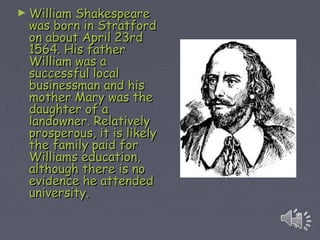William shakespeare Kelly
- 1. âš William ShakespeareWilliam Shakespeare was born in Stratfordwas born in Stratford on about April 23rdon about April 23rd 1564. His father1564. His father William was aWilliam was a successful localsuccessful local businessman and hisbusinessman and his mother Mary was themother Mary was the daughter of adaughter of a landowner. Relativelylandowner. Relatively prosperous, it is likelyprosperous, it is likely the family paid forthe family paid for Williams education,Williams education, although there is noalthough there is no evidence he attendedevidence he attended university.university.
- 2. âš In 1582 William, agedIn 1582 William, aged only 18, married anonly 18, married an older woman namedolder woman named Anne Hathaway. SoonAnne Hathaway. Soon after they had theirafter they had their first daughter,first daughter, Susanna. They hadSusanna. They had another two childrenanother two children but Williamâs only sonbut Williamâs only son Hamnet died aged onlyHamnet died aged only 11.11.
- 3. âš After his marriage, informationAfter his marriage, information about the life of Shakespeare isabout the life of Shakespeare is sketchy but it seems he spentsketchy but it seems he spent most of his time in Londonmost of his time in London writing and performing in hiswriting and performing in his plays. It seemed he didnât mindplays. It seemed he didnât mind being absent from his family -being absent from his family - only returning home during Lentonly returning home during Lent when all theatres were closed. Itwhen all theatres were closed. It is generally thought that duringis generally thought that during the 1590s he wrote the majoritythe 1590s he wrote the majority of his sonnets. This was a time ofof his sonnets. This was a time of prolific writing and his playsprolific writing and his plays developed a good deal of interestdeveloped a good deal of interest and controversy. Due to someand controversy. Due to some well timed investments he waswell timed investments he was able to secure a firm financialable to secure a firm financial background, leaving time forbackground, leaving time for writing and acting. The best ofwriting and acting. The best of these investments was buyingthese investments was buying some real estate near Stratfordsome real estate near Stratford in 1605, which soon doubled inin 1605, which soon doubled in value.value.
- 4. Shakespeare the PoetShakespeare the Poet âš William ShakespeareWilliam Shakespeare wrote 154 Sonnetswrote 154 Sonnets mostly in the 1590s.mostly in the 1590s. Fairly short poems,Fairly short poems, they deal with issuesthey deal with issues such as lost love. Hissuch as lost love. His sonnets have ansonnets have an enduring appeal dueenduring appeal due to his characteristicto his characteristic skill with languageskill with language and words.and words. ââLet me not to theLet me not to the marriage of truemarriage of true mindsminds Admit impediments.Admit impediments. Love is not loveLove is not love Which alters when itWhich alters when it alteration finds,alteration finds, Or bends with theOr bends with the remover to remove:âremover to remove:â Sonnet CXVISonnet CXVI
- 5. The plays of Shakespeare have been studied more than anyThe plays of Shakespeare have been studied more than any other writing in the English language and have beenother writing in the English language and have been translated into numerous languages. He was rare as a play-translated into numerous languages. He was rare as a play- write for excelling in tragedies, comedies and histories. Hewrite for excelling in tragedies, comedies and histories. He deftly combined popular entertainment with a raredeftly combined popular entertainment with a rare poeticcapacity for expression which is almost mantric inpoeticcapacity for expression which is almost mantric in quality.quality.   "This above all: to thine ownself be true,"This above all: to thine ownself be true,    And it must follow, as the night the day,   And it must follow, as the night the day,    Thou canst not then be false to any man.   Thou canst not then be false to any man.    Farewell: my blessing season this in thee!"   Farewell: my blessing season this in thee!"   Lord Polonius, Hamlet Act I, Scene 3Lord Polonius, Hamlet Act I, Scene 3
- 6. ⚠During his lifetime,During his lifetime, Shakespeare was notShakespeare was not without controversy, butwithout controversy, but he also received lavishhe also received lavish praise for his plays whichpraise for his plays which were very popular andwere very popular and commercially successful.commercially successful. Shakespeare died in 1664;Shakespeare died in 1664; it is not clear how he diedit is not clear how he died although his vicaralthough his vicar suggested it was fromsuggested it was from heavy drinking. Hisheavy drinking. His tombstone is marked withtombstone is marked with the following epitaph;the following epitaph; ⚠Good friend for JesusGood friend for Jesus sake forbearesake forbeare To digg the dustTo digg the dust encloased heareencloased heare Blessed by y man yBlessed by y man y spares hes stonesspares hes stones    And curst be he y   And curst be he y moves my bonesmoves my bones
- 7. âš It is true to say thatIt is true to say that each line ofeach line of Shakespeare has beenShakespeare has been poured over bypoured over by scholars and studentsscholars and students - no idea or concept- no idea or concept has been lefthas been left unturned.unturned. Shakespeare has leftShakespeare has left a profound and lastinga profound and lasting impact on literature,impact on literature, cinema and theatre.cinema and theatre.






